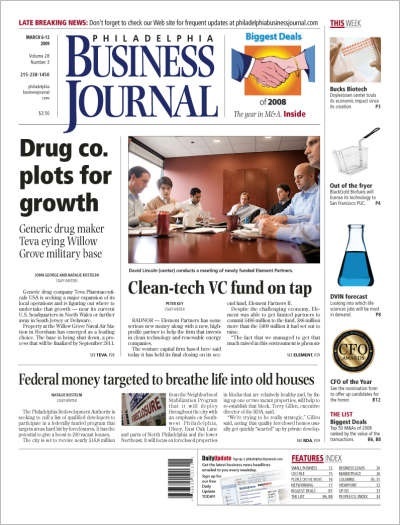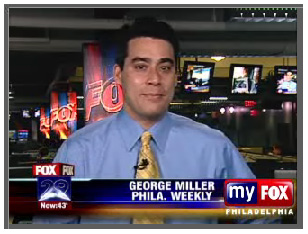Dealmakers say farewell to long, strong M&A market
It will be harder to close deals this year, but they're still being done.
From the March 6, 2009 Philadelphia Business Journal.
Deals are getting done despite the difficult economy, wary lenders, lowered valuations and overall financial uncertainty, local experts say.
But the frenetic pace of the past three years, with each year beating the record-breaking valuations and volume of the last, are, for now, over.
Mergers and acquisitions are receiving greater scrutiny from buyers, sellers and financiers. More deals are being structured with protections for all involved, and there is a greater reliance upon mezzanine-level funding as senior debt becomes more and more difficult to secure. Sellers are taking back notes and equity percentages continue to rise to keep deals rolling.
"You have to be more creative," said Richard Jaffe, a partner at Ballard Spahr Andrews & Ingersoll and president of the Philadelphia chapter of the Association for Corporate Growth (ACG), an association of companies and service providers active in M&As. "Sellers are trying different strategies because there are a lot of companies that, for one reason or another, want to get sold. I would term this a buyer's market if they can get financing."

The ACG reported that its local members were involved in 1,123 deals worth more than $90 billion in the region last year, compared with 1,324 deals in 2007 worth more than $89 billion. The Philadelphia chapter counts deals involving members in Pennsylvania from Harrisburg to the east, Delaware, and South Jersey below Princeton.
Worldwide, M&As totaled $2.9 trillion in announced deals during 2008, according to Thomson Merger News. It was the lowest level for annual deal activity since 2005, and a 29.6 percent decrease from 2007.
Much of 2008's activity was recorded during the first half of the year. Many of the deals that closed during the third and fourth quarters were transactions that were long in the pipeline. Several local insiders said that numerous deals collapsed during the second half of the year, and some companies liquidized as a result.
"You could hear a pin drop between November 1st and January 10th," said Nick Araco, a director in RSM McGladrey's Philadelphia office. "That's kind of unheard of. Usually we're rushing around, looking at deals people are trying to close before the end of the calendar year. A lot of deals that were supposed to close, stalled. We did all our diligence work but capital structures collapsed, debt components disappeared completely, and deals were stuck in limbo."
Fourth-quarter worldwide volume dropped 34.6 percent from the third quarter of last year, and was down 37.1 percent from the fourth quarter of 2007, according to Thomson. Around the world, more than 1,100 deals collapsed in large part because of global financial uncertainty. During 2007, fewer than 800 deals fell apart.
According to Curtis Financial Group, only 75 deals closed in the region during the fourth quarter of 2008, as opposed to 147 during the same period in the previous year, and 145 in 2006.
During the first quarter of last year, Curtis Financial reported 142 regional deals, more than any first quarter of the previous three years.
"At the beginning of the year, everyone was optimistic that things would continue," said Kathleen Shay, a partner who handles mergers and acquisitions at Duane Morris in Philadelphia. "But when the liquidity crisis really became bad in the late summer and fall, it really destroyed the capital markets."
"By the end of the year, I was seeing that some companies were in tune to just stay alive, make it work," Shay continued. "For the most part, they were finding transactions where they could have strategic alliances."
Many deals involved complex "earn-outs," performance-based incentives for the sellers should they reach specified goals. For example, when Novartis AG purchased Protez Pharmaceuticals of Malvern for $100 million in cash in June, the contract stipulated that Protez could earn up to $300 million more if certain clinical milestones, regulatory approvals and commercial targets are achieved.
Howard Snyder of Curtis Financial argued that the slowdown in dealmaking is exaggerated by the fact that after the 2001-2002 recession, M&As were championed by lenders who offered friendly terms and questionable covenants.
"Especially over the previous 18 to 24 months, there was an explosion of capital availability at historically loose terms," Snyder said. "What we're seeing now is a return to a more selective - and possibly too selective - investment or lending criteria."
He said that despite the gloom, capital is available.
"The kinds of transactions that are happening are growth investments by well-heeled companies that are looking four, five or six years out," Snyder said.
He has identified more than 2,500 well-run, privately held, middle-market companies in the Greater Philadelphia region that could be targeted.
Financial buyers are salivating at the lowered valuations, experts said, but securing financing has become difficult.
Venture capitalists invested $28.3 billion in 3,808 worldwide deals in 2008, compared with $30.8 billion in 3,952 deals in 2007, according to the MoneyTree Report by PricewaterhouseCoopers and the National Venture Capital Association (NVCA), based on data from Thomson Reuters. It was the first time since 2003 that the totals dropped below the previous year.
During the fourth quarter of last year, venture capital investments totaled $5.4 billion, the least amount spent since the first quarter of 2005. During the first three quarters of 2008, venture capitalists invested more than $7 billion per quarter, and during the fourth quarter of 2007, financial investors spent more than $8 billion.
"The leveraged loan market is still in miserable shape, so bigger deals are not likely to resume for some time," said Patrick Hurley, managing director at MidMarket Capital Advisors in Philadelphia. "The smaller deal market, especially for add-on acquisitions, is actually pretty good because the banks that are still in business want to show some activity."
NewSpring Capital of Radnor totaled 14 transactions in 2008, making it among the most active buyers in the region. Its mezzanine fund closed four deals, compared with six in 2007 and four in 2006.
"What I see out there is fear," said Michael DiPiano, a general partner of NewSpring Ventures and the managing partner of NewSpring Capital. "It just changed so fast. The rhetoric on all your television news stations and the Internet is so negative, and so flamboyantly negative."
Still, he predicted that valuations had bottomed. His firm is cautiously looking for investment opportunities.
"Everyone is optimistic that things will settle down, but they are not optimistic that it will happen quickly," Duane Morris' Shay said. "Everyone is saying that 2009 is not going to be a good year. If things go well, and decisions made by the government are good decisions that have the right impact, then 2009 will build the base for 2010."








